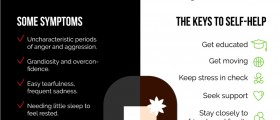Chronic dysthymia is the chronic form of depression that usually has a milder form than clinic depression, but it generally lasts for longer. Symptoms of chronic dysthymia typically last for at least two years and this condition is often hard to diagnose since this bad state of mind manifests as a part of patient’s character. Therefore, patients rarely discuss about their symptoms with doctors, family members, or friends, even though it can be severely disabling.
Even though it is milder than clinic depression, dysthymia affects patients’ lives more critically because it lasts for so long. In many cases, these patients have a chronic lack of concern about normal daily activities, feelings of hopelessness, lack productivity and low self-esteem.

Symptoms of chronic dysthymia
Dysthymia symptoms usually include bad mood and prevalent feelings of sadness. Consequently, persons affected with this disorder usually lose interests in daily activities, and they seem and feel like very sad and fatigued individuals. Patients suffering from chronic dysthymia have low self-esteem, troubles concentrating and making decisions and generally decreased productivity. In many cases, patients will experience changes in the eating pattern.
Some of them may have a poor appetite while the others may start overeating. Sleeping problems are also common. Symptoms of chronic dysthymia generally exclude symptoms of manic, hypomanic or mixed episodes, which are commonly associated with the bipolar disorder. If patient experiences all the typical symptoms plus manic, hypomanic or mixed episodes, he or she may suffer from cyclothymia, which is a serious mood and mental disorder that cause both hypomanic and depressive episodes.
Causes for chronic dysthymia
Scientists still do not know what exactly causes dysthymia. However, there is a strong evidence this condition may have roots similar to depression. For example, dysthymia tends to run in the families, and it may be common in people whose biological family members also have chronic dysthymia.
Similarly, the cause behind dysthymia may include physical changes in the brains. These biochemical causes are associated with brain chemicals called neurotransmitters. Neurotransmitters regulate the mood, among many other things, and may play a role in causing chronic dysthymia.
Environmental causes are also associated with dysthymia. Stress, for example, may trigger chronic dysthymia, especially if a person lives through a situation that is difficult to cope with, such as the loss of a close person, or existential problems.
Treatment for chronic dysthymia
Treatment for this chronic condition is usually administered by combining medications and psychotherapy. Most commonly used medications are selective serotonin reuptake inhibitors because they work well and their side effects are tolerable.

















Your thoughts on this
Loading...